Historic ‘I Am A Man’ Strike of Memphis Sanitation Workers Inspires APWU
August 23, 2018
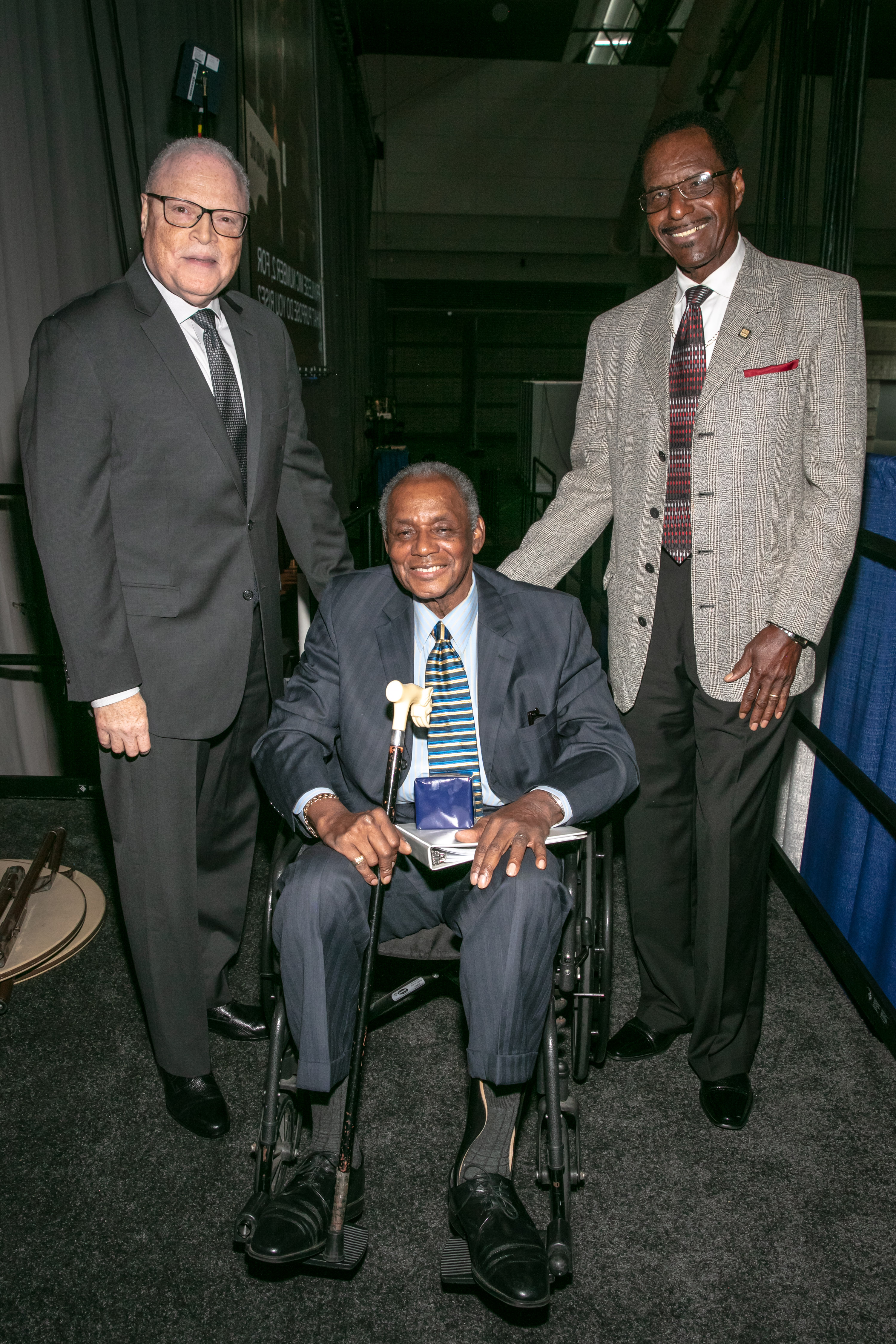
On day 3 of the 24th Biennial National Convention, the delegates heard from American Federation of State, County and Municipal Employees (AFSCME) leaders about the 1968 Memphis Sanitation Workers Strike. Many delegates found inspiration from the integral link between our past and present struggles, and from the crucial connection between the civil rights and labor movements.
Rev. Cleophus Smith, Memphis sanitation striker and current activist who mentors up-and-coming working-class leaders, reflected on how difficult the years were before the strike, and shined a light on the atrocities faced by the poor black working-class. “In 1967, when I went to work for the sanitation department, my job was so tedious… It was cold that year,” he said. “We’re out there working with no sufficient gloves, no sufficient clothes, no sufficient shoes… there was a steel voice in me that just kept telling me to hold on.”
“I held on and in 1968 when we went on strike we were out for 65 long days,” he continued. “Many of us had wives and children… There were many days that I went home and just had enough food for my children to eat.”
William “Bill” Lucy, former Secretary-Treasurer of AFSCME, founder of the Coalition of Black Trade Unionists and member of the APWU Cleveland Area Local, shared his experiences as a leading AFSCME staffer in the historic strike. “The Sanitation Strike of 1968 is one of the great struggles of working people in general and black workers in particular,” he said. “Equally important, this struggle occurred at a time when Dr. Martin Luther King Jr. was attempting to put a face on poverty for our entire nation to see. And while these two things are separate, they are tied together by a common thread – the plight of the working poor.”
“We are celebrating this 50th anniversary not as a one-day issue,” Lucy said. “This is an ongoing struggle we should all be engaged in…We have to raise this nation up to give everyone an opportunity to enjoy the fruits of their labor.”
Rising up is precisely what current AFSCME President Lee Saunders encouraged when he spoke to the delegation. “The civil rights and the labor movements had – and still have – common values, as well as common enemies,” he said. “Dr. King understood all this and he understood we couldn’t have racial justice without economic justice.”
“We are in a movement moment. A movement moment that builds on the legacy of the Memphis Sanitation Workers,” Saunders said.
After the speakers, Ohio Delegate and Greater Cincinnati Area Local President Michael Smith called for a moment of commemoration in honor of the 50th Anniversary of the Memphis Sanitation Workers Strike, to which the floor erupted in cheers and applause.
Delegates Complete Work on Constitution, Labor-Management, Legislative Resolutions
 Delegates spent most of the convention’s third day discussing, debating and voting on resolutions on behalf of the APWU members they are representing at the convention.
Delegates spent most of the convention’s third day discussing, debating and voting on resolutions on behalf of the APWU members they are representing at the convention.
Resuming its report from day two, the Constitution Committee reported on a resolution that called for modifying the procedure for distribution of campaign articles of candidates running for national APWU office. Previously, a candidate had the opportunity to submit a campaign statement of up to 300 words that was published in The American Postal Worker magazine.
Constitutional language adopted by delegates now provides for up to 1,000 word candidate statements to be published in an election issue of The American Postal Worker and included in the same envelope as the ballot for the national election of officers.
The delegates voted down a resolution that would have changed the frequency of national conventions from two to three years. After a lengthy debate that resulted in a teller count, a resolution calling for the All Craft Conference to be extended by two additional days fell 32 votes short of the required two-thirds majority required for adoption.
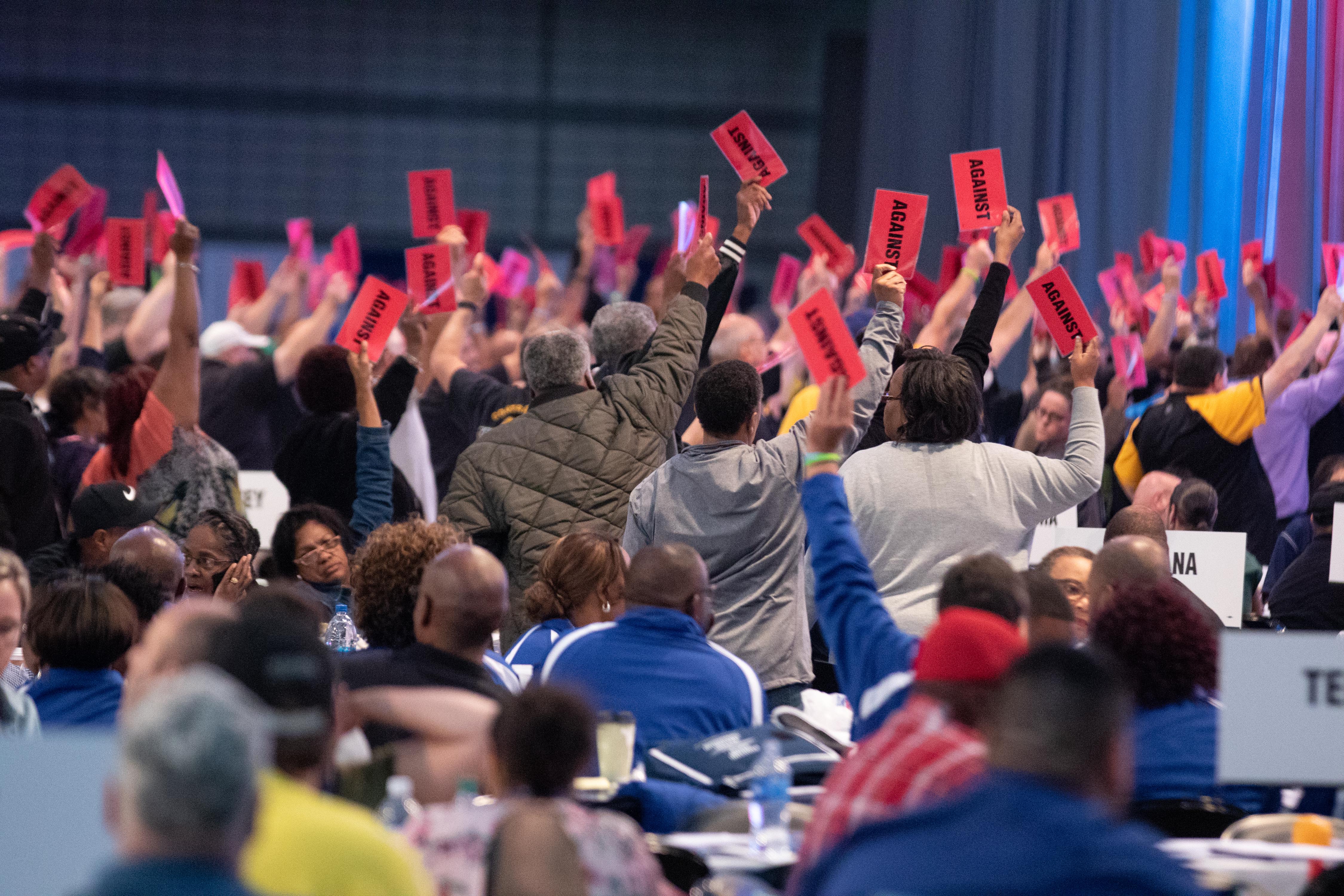 Returning to the Labor-Management Committee report, delegates acted upon a number of resolutions primarily concerning proposals for future contract negotiations; such as: annual and sick leave, PSE health care, clothing/uniform allowance, workplace harassment/sexual harassment, representation, PSE maximization, and seniority.
Returning to the Labor-Management Committee report, delegates acted upon a number of resolutions primarily concerning proposals for future contract negotiations; such as: annual and sick leave, PSE health care, clothing/uniform allowance, workplace harassment/sexual harassment, representation, PSE maximization, and seniority.
Delegates also adopted a resolution calling for a light duty/pregnancy policy in the workplace that would assist employees before, during and after childbirth based on the Pregnancy Discrimination Law of 1978. Included in this law are anti-discrimination provisions, workplace accommodations and job protections.
After conclusion of the Labor-Management Committee report, the Legislative/Political Committee presented eight resolutions for the delegates’ consideration; including: retirement, voter registration, PSE contributions to Thrift Savings Plan, civic engagement and healthcare justice.
Delegates unanimously adopted a resolution opposing privatization of Veterans Administration health care.
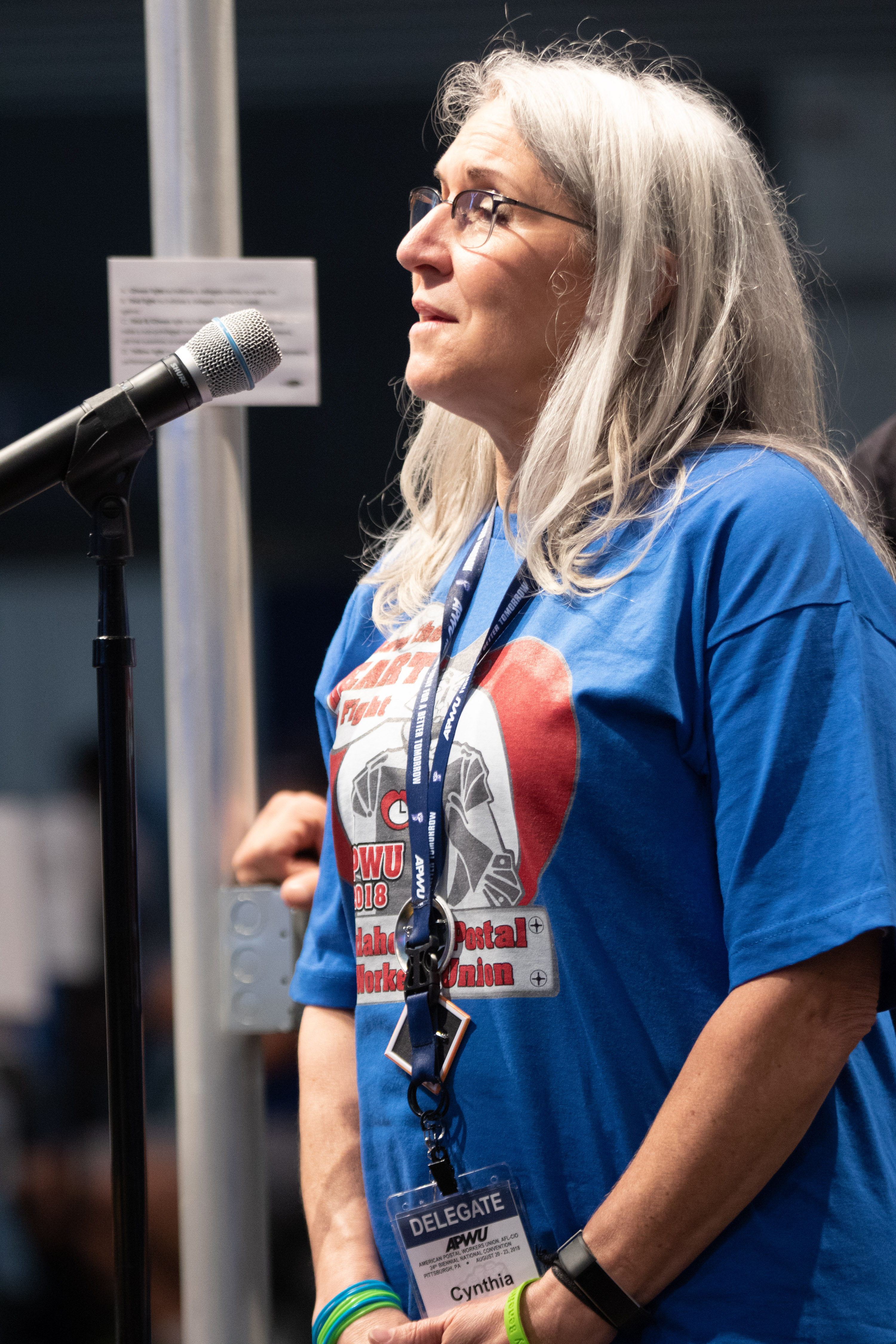
The resolution said:
The American Postal Workers Union opposes the continued diversion of public funds appropriated for the Veterans Health Administration (VHA) into the private sector. We support full funding of existing VHA programs, funding for more VHA staff and adequate federal support for VHA programs…the APWU opposes the ongoing privatization of veteran’s health care as an attack on an effective and necessary public program and believes that privatization is not consistent with this nation’s responsibility to provide health care for those who have put themselves in harm’s way on their country’s behalf.
The convention also adopted a resolution calling for the APWU and its local and state organizations to start an active community involvement program locally, regionally and nationally. The resolution urges the APWU, its local and state organizations to:
Build relationships and foster mutual accountability among those with common interests, respecting the power of dissent and sharing and honoring the gifts of all, so non-activists can go from being observers to activists that will help lead robust community-led engagement…
This program will work to create an engagement environment that links neighborhood concerns to larger regional, state, and national issues and will allow voters to realize their fullest potential to change their circumstances on a larger scale.
Message from the NAACP: Let’s Focus on Action!
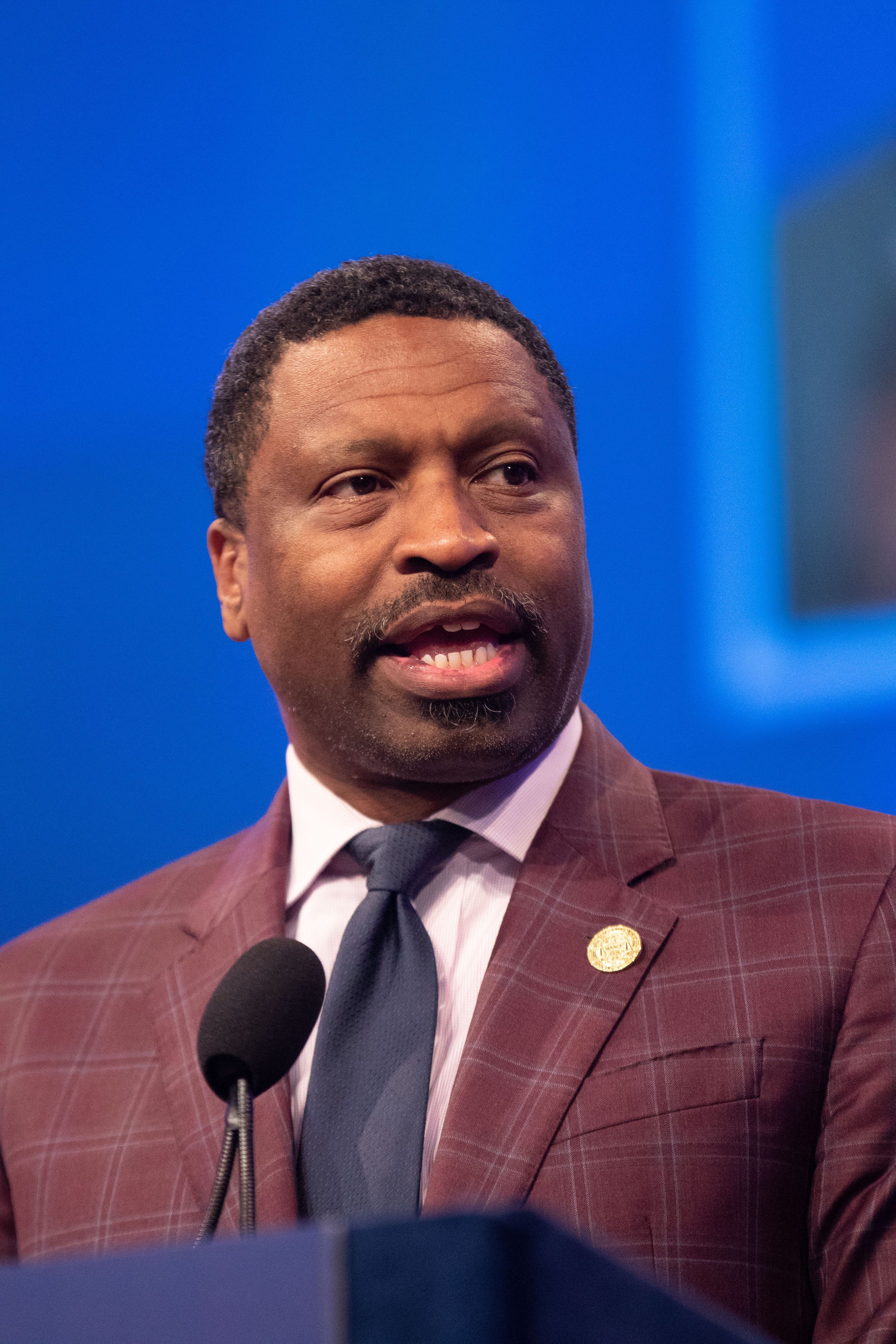 National Association for the Advancement of Colored People (NAACP) President Derrick Johnson, brought greetings and solidarity to the convention floor.
National Association for the Advancement of Colored People (NAACP) President Derrick Johnson, brought greetings and solidarity to the convention floor.
“For many years we perceived these two movements as separate, when in fact, they’re the same movements,” he said. “There would have never been a civil rights movement, if people were not being exploited for free labor. We called that slavery. There would have never been a civil rights movement, if people were not being exploited for cheap labor, under a system of segregation.”
He continued to discuss how there’s only one movement, a movement “focused on always respecting the dignity of a fair day’s work.”
“Race is a social construct, created to divide people and distract so those in power maintain power. In the movement that we call the labor movement, we cannot be distracted by the questions of race,” he explained.
He called for all to take action this November to shift power towards “a political landscape that will focus on the needs and interests of those of us in this room.”
“I’ll leave here, sending a message to my members, asking them to call their representative to support House Resolution 993 to send a strong message that the Postal Service should not be privatized.”
Delegates Adopt Certified Deaf Interpreters Resolution
 Texas Postal Workers Union delegate, Aulby Gillett, spoke in favor of a resolution calling for the use of Certified Deaf Interpreters in lieu of Video Remote Interpreing (VRI) during engagements between Deaf/Hard of Hearing workers and management.
Texas Postal Workers Union delegate, Aulby Gillett, spoke in favor of a resolution calling for the use of Certified Deaf Interpreters in lieu of Video Remote Interpreing (VRI) during engagements between Deaf/Hard of Hearing workers and management.
Signing with an interpreter translating, Brother Gillet said, “I represent the APWU Deaf/Hard of Hearing Task Force Committee.”
He explained the internet is unreliable and VRI provides no privacy, as interpreters are remote and the security and privacy of their premises is unreliable. As further evidence, he said there have been incidents when “VRI may ask the Deaf / Hard of Hearing’s spouse or friend to join in to help…in direct violation of the Americans with Disabilities Act.”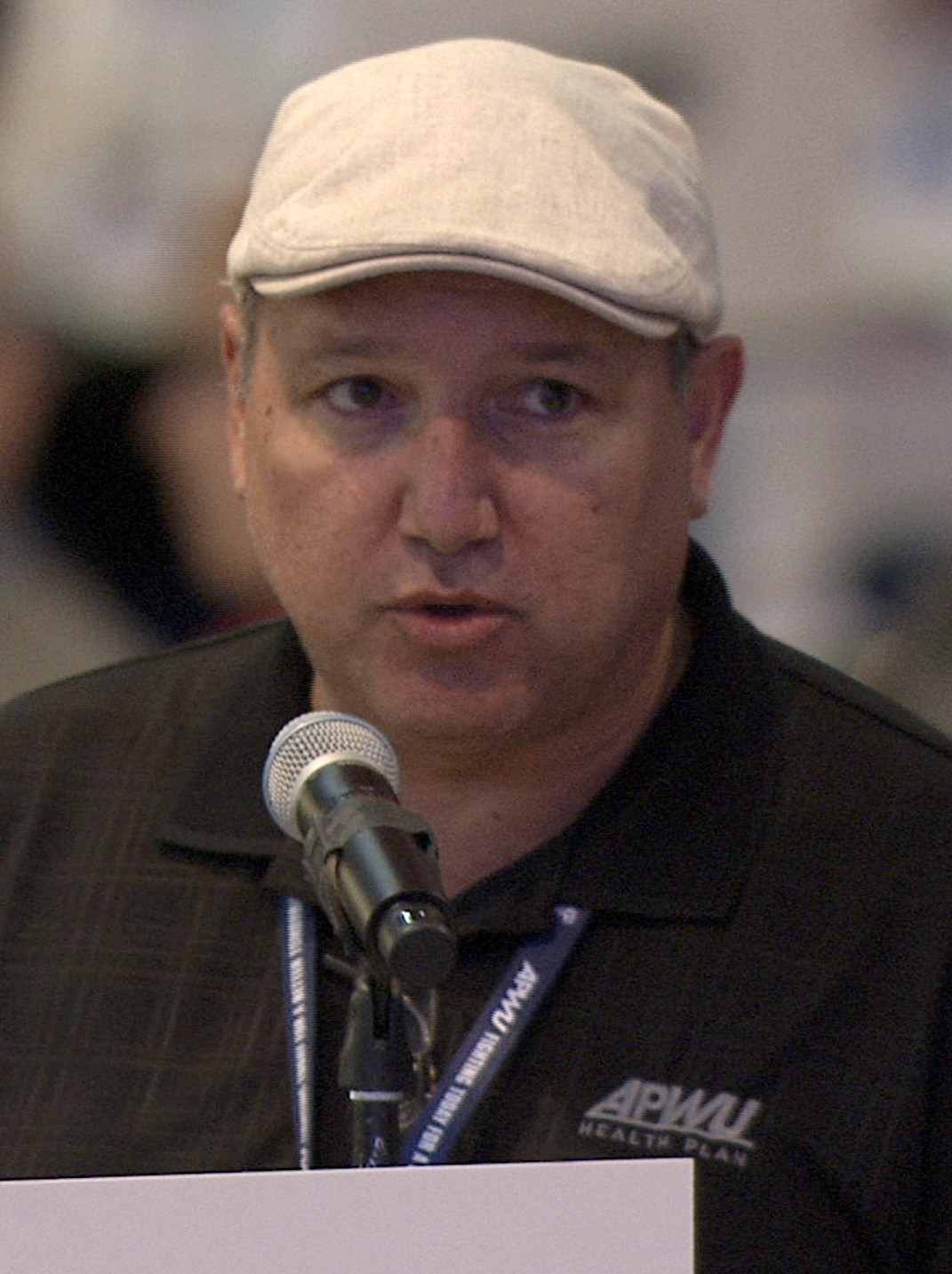
John Zamudio, a hearing delegate from Missouri, rose in support of the resolution. “Brothers and Sisters, we should support our Deaf/Hard of Hearing employees. It’s a disgrace what [management] do[es] to them on the workroom floor. If they go into a job discussion, it should be in private.”
In a resounding sign of solidarity, convention delegates unanimously adopted this resolution.
Opinion-Editorial Workshop Draws Large Crowd
In a room filled to near capacity, APWU Legislative & Political Director Judy Beard welcomed postal workers to the workshop, Opinion-Editorial Writing: Combine Your Story with Facts to Defend the Postal Service.
Sarah Anderson of the Institute for Policy Studies taught members techniques for covering the basics of opinion-editorial writing and how to combine personal experiences with facts to make a persuasive case against privatization. She also covered an alternative to opinion-editorials, which is a letter-to-the-editor.
During a brainstorming session, participants shared personal postal-related experiences they thought could be used to develop their own opinion-editorial pieces.
In current and future attempts to privatize the Postal Service public support will be needed in order to stop it. Defending the USPS through the opinion-editorial or letter-to-the-editor column is an effective way to educate the public about this important issue and generate support.
Credentials Committee
As presented by Co-Chairperson Alice Lee of the Richmond Virginia Area Local the report for the APWU Credentials Committee for Wednesday, August 22 is as follows:
The 24th Biennial Convention’s 2,119 delegates represent 313 locals, 50 states, Guam, Puerto Rico and the Virgin Islands. Also in attendance, 77 national officers and five retiree delegates.



